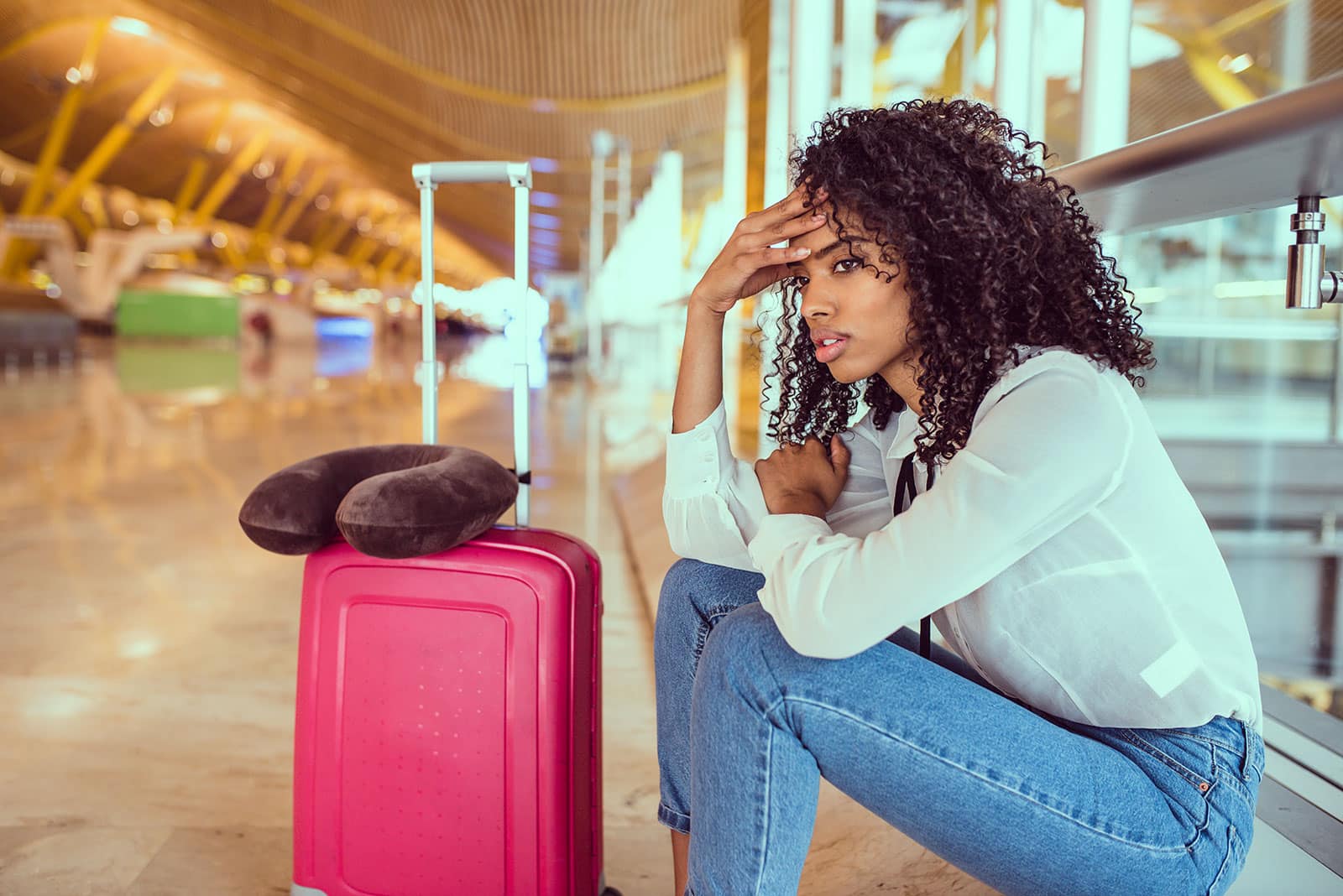A flight can be a very stressful affair with long lines, rushed schedules, security checkpoints, turbulence, and everything else. Long flights may sound scary too especially if you’re a first-timer. If it’s your first flight and traveling alone, you don’t know what to expect. While some people developed a fear of flying due to bad past experiences on a flight.
Many people take Xanax, Valium, or other anxiety medications to deal with pre-flight nerves or to deal with flight anxiety. While these prescription medications may effectively treat anxiety disorders and other mental health conditions, people should only take them under a doctor’s supervision.
Xanax misuse can be extremely dangerous, and you don’t want to have a medical emergency while on air travel. So you need to read this easy guide to learn more about Xanax abuse and find out how to get help if you have a problem.
Table of Contents
- 1 What Is Xanax?
- 2 Is Xanax Addictive?
- 3 Is It Okay To Self-Medicate With Xanax?
- 4 Can Xanax Cure My Anxiety?
- 5 What Should I Do if I’m Anxious About Flying?
- 6 How Much Xanax Should I Take?
- 7 Is Mixing Alcohol and Xanax Dangerous?
- 8 Will I Go Through Withdrawal After Quitting Xanax?
- 9 Is an Addiction Treatment Program Worth It?
- 10 Safeguard Your Health and Future
What Is Xanax?
Xanax is the trade name of alprazolam, a common benzodiazepine. Doctors commonly prescribe Xanax to treat anxiety disorders and panic disorders. With the right dosage and under a doctor’s supervision, Xanax can prevent panic attacks and ease symptoms of anxiety.
Xanax has stronger side effects than most other anxiety drugs, especially the sedation and drowsiness part. Thus, if you haven’t taken an anti-anxiety medication to treat anxiety before, then your doctor will likely try to put you on a drug with fewer side effects before prescribing a benzodiazepine.
Is Xanax Addictive?
Like other benzodiazepines, Xanax has a fairly high risk of addiction. This is why it’s so important to follow your doctor’s instructions when taking this medication. Snorting Xanax, regularly taking more than your prescribed dosage, drinking liquor with Xanax, and mixing it with other drugs can be very dangerous. If you feel the urge to misuse Xanax, then you should talk to your doctor immediately so that they can wean you off the drug and find a safer alternative.

Xanax for Flying
Is It Okay To Self-Medicate With Xanax?
You should not consume Xanax without a prescription for any reason, even if you have a flying phobia. Ii is never okay to take Xanax without medical advice. When a doctor prescribes Xanax, they take the patient’s weight, gender, symptoms, medications, health conditions, and other factors into account to find a safe and effective dosage.
Without a medical professional’s guidance, you could easily overdose on Xanax, exacerbate an undetected medical condition, have a bad drug interaction, or develop an addiction. Taking someone else’s prescription can be incredibly dangerous.
While a dealer or friend may say that they’re giving you a certain dose of Xanax, you have no way to verify that information. Unfortunately, drug dealers and illegal drug manufacturers are very skilled at making counterfeit prescription drugs appear authentic.
In turn, you may think that you’re purchasing Xanax when you’re actually getting something else that the manufacturers could have laced with fentanyl and other deadly adulterants. Self-medicating is very risky, and you don’t want to put your life on the line to treat your anxiety.
With that in mind, if you think that you need Xanax or another prescription drug to treat your anxiety, then you must speak to a doctor and follow their instructions.
Can Xanax Cure My Anxiety?
Xanax treats the symptoms of anxiety, but it is not a complete solution. To stop worrying so much about flying, you need to understand and address the root causes of your anxiety. Your doctor will likely refer you to a mental health specialist to help you develop effective coping mechanisms. Depending on your health and the extent of your symptoms, the doctor may or may not prescribe Xanax or another drug to take in conjunction with psychotherapy.
What Should I Do if I’m Anxious About Flying?
If you have a fear of flying or if it’s your first time going on a flight, there are things you can do to avoid being anxious. You don’t have to resort to anxiety meds right away. On your next flight, try these tips.
Arrive at the Airport Early
The hustle and bustle of going through the security checkpoint, waiting in all sorts of lines, checking in, and sticking to a tight schedule may induce a lot of anxiety. You may panic, feel sweaty, and your heart rate beats so fast.
You can avoid some of that pre-flight tension by arriving at the airport an hour earlier than you normally would. The lines will be shorter, so you’ll get more time to relax and take care of any last-minute issues before your flight.
Bring Entertainment
Knowing that you’re in an aircraft thousands of feet above the ground can be pretty unnerving. To distract yourself from that sense of helplessness, you should bring a book or download your favorite movies, shows, and audiobooks. A good pair of noise-canceling headphones will help you sleep, and soften any loud or sudden noises during your flight.
Speak to a Doctor About Your Anxiety
If you still feel intense anxiety about flying no matter what you try, then you must speak to your doctor as soon as possible. Making it to a physical doctor’s appointment can be inconvenient, but many doctors now offer telemedicine services so that you can access high-quality healthcare from the comfort and convenience of your own home.
When discussing your problems with your doctor, make sure to include as many details as possible. Even if a certain aspect of your experience seems mundane or insignificant, it can give your doctor more insight into your condition, so try to be open and honest about your symptoms and feelings. The intervention for fears and phobias is Exposure Therapy which a therapist can help with.
How Much Xanax Should I Take?
Your doctor is the only person who can determine how much Xanax you should take. If you feel like your current dosage isn’t working, then you should let your doctor know right away. They’ll increase your dosage, put you on another medication, or find some other solution to your problem.
Do not change your dosage without consulting a doctor. Failure to take the prescribed dose at the proper frequency may lead to an overdose, worsen anxiety issues, drug resistance, and other serious problems.
Is Mixing Alcohol and Xanax Dangerous?
Alcohol is one of the worst substances to take with Xanax. Even a single drink, while you’re on Xanax, could lead to severe memory loss, poor coordination, impaired judgment, and respiratory problems.
Drinking heavily and taking Xanax at the same time may result in severe liver damage, brain damage, overdose, coma, and death. Xanax can take up to three days to completely leave your system, so you should not consume alcohol if you’ve taken Xanax within the last few days.
Will I Go Through Withdrawal After Quitting Xanax?
Most individuals who struggle with Xanax addiction begin to experience acute withdrawal symptoms within three days of their last dose. Common symptoms of Xanax withdrawal include anxiety, insomnia, muscle spasms, psychosis, seizures, nausea, light sensitivity, and body aches.
These symptoms will peak within a couple of weeks and persist for up to a month. Heightened anxiety and other psychological symptoms may continue for years after a patient quits Xanax. The first month of Xanax withdrawal is extremely challenging.
Thus, increasing your odds of success and minimizing the chances of experiencing a seizure or psychosis at a dangerous time. You should consider enrolling in a detox program at an addiction recovery facility. Detox centers employ medical staff and therapists to keep patients safe, healthy, and comfortable as they endure the worst withdrawal symptoms.
Is an Addiction Treatment Program Worth It?
Individuals who go through professional addiction treatment programs are more likely to maintain long-term sobriety. In a treatment program, you’ll attend therapy sessions with a qualified addiction professional to address your substance use, anxiety, and other problems.
You’ll also attend group sessions with other individuals who suffer from addiction, and you can participate in a wide range of fun and healthy activities at the treatment center. During the treatment process, you will build the necessary coping strategies to manage your anxiety and avoid abusing drugs for the rest of your life.
An inpatient program will completely remove your access to Xanax and other addictive substances for the duration of your stay. This will greatly increase your odds of making it through the most difficult stage of addiction recovery. No two patients experience addiction or anxiety in the same way, so the therapists at a reputable addiction recovery center won’t treat you with a one-size-fits-all approach.
Instead, they’ll assess your condition and consider your thoughts and feelings as they craft a treatment regimen that works for you. You only live once, so it’s important to do everything in your power to keep your mind and body healthy. An addiction treatment program will give you the right tools for lifelong success, sobriety, and happiness.
Safeguard Your Health and Future
Between the risk of overdose, serious injury, legal trouble, permanent brain damage, organ failure, and psychological harm, misusing Xanax is just not worth the supposed benefits. Quitting Xanax can be challenging, but you don’t have to do it alone. If you want to treat your anxiety and stop abusing Xanax, then you should call or email NJ Addiction Resources as soon as possible to find the best treatment program for your unique needs.

